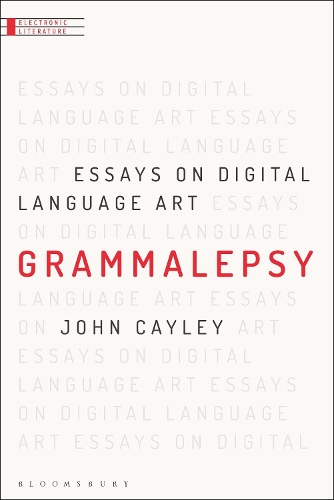
Grammalepsy: Essays on Digital Language Art
(Paperback)
Available Formats
Publishing Details
Grammalepsy: Essays on Digital Language Art
By (Author) Professor John Cayley
Bloomsbury Publishing PLC
Bloomsbury Academic USA
19th March 2020
United States
Classifications
Tertiary Education
Non Fiction
Literary studies: c 1900 to c 2000
Media studies: internet, digital media and society
Media studies
Technology: general issues
Digital Lifestyle and online world: consumer and user guides
302.22440285
Physical Properties
Paperback
312
Width 152mm, Height 229mm
417g
Description
This book is available as open access through the Bloomsbury Open Access programme and is available on www.bloomsburycollections.com. Collecting and recontextualizing writings from the last twenty years of John Cayleys research-based practice of electronic literature, Grammalepsy introduces a theory of aesthetic linguistic practice developed specifically for the making and critical appreciation of language art in digital media. As he examines the cultural shift away from traditional print literature and the changes in our culture of reading, Cayley coins the term grammalepsy to inform those processes by which we make, understand, and appreciate language. Framing his previous writings within the overall context of this theory, Cayley eschews the tendency of literary critics and writers to reduce aesthetic linguistic makingeven when it has multimedia affordancesto writing. Instead, Cayley argues that electronic literature and digital language art allow aesthetic language makers to embrace a compositional practice inextricably involved with digital media, which cannot be reduced to print-dependent textuality.
Reviews
An essential book for many reasons. The quality of the authors theoretical sharpness and reflection is of course one of them, and one will find in this book an in-depth but often somewhat polemic dialogue with all the major critics and theoreticians in the field ... One can only be admiring of the pioneering and visionary dimension of these essays, often much ahead of their times. * Leonardo Music Journal *
John Cayley has been a respected figure in digital language art since his first works appeared in the 1970s. For decades, his distinctive creative approach has combined with careful, critical, erudition to continually chart new directions in the field of emerging literary practices. This collection of essays, many of which are now canonical references, tracks twenty years of Cayleys thinking about poetics, code, and composition. As for this radical new conceptgrammalepsy as a way to understand how language is grasped and readit will no doubt have a long-term ripple effect through the multiple domains of linguistic discourse. * Johanna Drucker, Breslauer Professor of Bibliographical Studies, UCLA, USA *
John Cayley has already had a deep and lasting influence on the fields of new media studies, electronic literature, conceptual writing, and poetics and this long-awaited volume elegantly frames his most important critical essays as well as his artistic practice. No one has done more to theorize, and translate, the philosophical and aesthetic complexity of digital language art, and this volume will endure as the definitive compilation of Cayleys work. * Rita Raley, University of California, Santa Barbara, USA *
Author Bio
John Cayley is Professor of Literary Arts at Brown University, USA. He has practiced as a poet, translator, publisher, and bookdealer, practices which have often intersected with his training in Chinese culture and language. In addition to his internationally recognized writing on networked and programmable media, he has written two printed books of poetic work, Ink Bamboo (1996) and Image Generation (2015).
